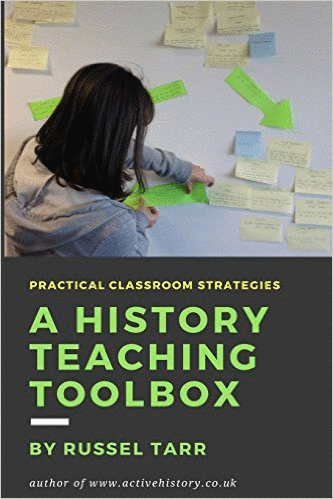IB History: ActiveHistory
An ActiveHistory subscription provides everything you need to construct and deliver a two-year IBDP History course from start to finish using the ActiveHistory IB History Hub.
These consist not just of lesson plans, worksheets and teacher notes, but also multimedia lectures and interactive games and historical simulations ideal for remote learning and self-study.
Use the ActiveHistory curriculum maps and the ActiveHistory syllabus topics to design your own course effectively.
We also have you covered for the Internal Assessment, Extended Essay and Theory of Knowledge in History, not to mention Essay and Sourcework Skills, IBDP History Model Essays and IBDP History Sample Sourcework Exercises / Model answers!
The French Revolution and Napoleon
A. Causes of the French Revolution
Teacher Introductory PowerPoint
A series of images designed to get students thinking firstly about what the topic for study is going to be, and then highlighting some of the key issues surrounding it - in particular, what the central causes of the French Revolution were, how far it delivered on its promises in the period 1789-1799, and whether Napoleon betrayed or consolidated the spirit of the French Revolution.
Research and Presentation Task | Sample Presentation
Students study some sample examiners' markschemes for questions relating to the causes of the French Revolution to analyse what appear to be the central factors identified. They then watch a 30-minute video to develop their understanding further. They organise their findings under key headings, then each student has to research one key factor in more detail and deliver a classroom presentation. A sample presentation is available too.
Historiography: Causes of the French Revolution
After producing the first draft of their essay ("What were the main causes of the French Revolution?"), students are then provided with this detailed summary of some of the key schools of thought surrounding the French Revolution. Their task is to research some of the key historians and books referred to within the document using tools such as Google Books, Amazon / GoodReads reviews and identify further quotes and evidence which which to develop their essay further.
Keyword Checker: "What were the Causes of the French Revolution?"
Students can run their essay through this tool prior to handing it in (and the teacher can also do so in the marking phase) to provide a quick check of which key terminology has been used in the essay.
Model Essay: "What were the Causes of the French Revolution?" (teacher password required)
A sample essay which I wrote myself in timed conditions for the benefit of my students.
B. Aims of the French Revolution
Defining the Debate: Enlightenment Philosophy
In order to measure the success of the French Revolution, it is necessary to
determine the professed aims of the Revolution. In this activity students will analyse the beliefs of key Enlightenment philosophers to reach a more detailed understanding of what the Revolutionaries really meant when the claimed to stand for "Liberty, Equality, Fraternity". A completed Teacher Version is also available.
In-Depth Focus on Enlightenment Philosophy: Thomas Paine and the Rights of Man
With a general understanding of Enlightenment Philosophy now secured, students look in more depth at the "Rights of Man" to develop their understanding of the aims of the French Revolution. Links to two excellent video clips are also provided.
C. Events of the French Revolution
Analytical Research Template: Events of the French Revolution
This template allows students to analyse events from the detailed timeline (below) in terms of the key concepts of 'Liberty, Equality, Fraternity' by dividing those concepts into practically measured criteria. There is also a completed teacher version available, along with links to recommended YouTube video clips.
Detailed, Interactive Timeline of Key Events
This interactive timeline provides a comprehensive overview of the key events of the French Revolution and is designed to accompany the worksheet listed above.
Picture Challenge: Key Events of the French Revolution
Taken directly from the timeline, this quiz provides a series of key images relating to the period. In teams, students have to correctly identify the event relating to each picture.
Discussion Points and Conclusions
This worksheet guides students through some of the key questions arising from the analysis thus far to ensure that the essay question ("To what extent did the French Revolution deliver on its promises?") is approached with sufficient rigour.
Model Essay: "To what extent did the French Revolution deliver on its promises of Liberty, Equality, Fraternity?" (teacher password required)
A sample essay which I wrote myself in timed conditions for the benefit of my students.
D. Written Sources about Napoleon
Silent Discussion: Impressions of Napoleon
In this activity students conduct a 'Silent Discussion' about Napoleon (instructions included) based around 12 primary sources. In this way they start to form impressions about whether Napoleon was a revolutionary or a reactionary.
Infographic Task: What sort of a man was Napoleon?
This framework encourages students to produce a one-sided A3 infographic about Napoleon as a revision aid.
E. Visual Sources about Napoleon
Napoleonic Propaganda: Analysing Portraits Worksheet | Images for download
In this activity students are given a detailed introduction to the art of propaganda in Napoleon's France and they are then presented with a wide range of images. Students have to match the captions to the pictures and then decide how to categorise the various pictures. Each student produces a detailed analysis of one portrait and then they are all placed on display and students draw their conclusions about what message Napoleon was trying to portray and whether this changed over time. There is a completed Teacher Answer offering a view on whether these images suggest Napoleon was a reformer or a reactionary.
F. Napoleon on Trial: Did he betray the spirit of the French Revolution?
Classroom Trial: Did Napoleon betray the spirit of the French Revolution?
The class will be divided into teams to research different aspects of Napoleon's Rule. Prosecution will be pitted against Defence, with other students acting as judges. The job of the judges at the end of the discussion of the first issues is to decide which of the following words best applies to Napoleon in this case, chosen from this continuum:
| Revolutionary | Reformer | Consolidator | Underminer | Destroyer |
Past Examination Questions
A selection of past examination questions and examiners' markschemes. One of these could be chosen at random for the class to attempt in timed conditions; alternatively different students could write essays on different titles and then they are exchanged later for revision purposes.
G. The Fall of Napoleon
Timeline and Multimedia Presentation
Although the main focus of our study unit has been Napoleon’s domestic policies, the above question highlights that it may be necessary to contrast these with his foreign policies in a ‘to what extent’ style of question. The objective of the following activity is therefore to ensure that you have the material able to do so. As you read through this timeline as a class, supplemented with audio-visual sources for extra notes using the multimedia presentation (which comes complete with images AND video clips!) consider which of the following two viewpoints strikes you as the most convincing:
Interpretation 1: The ultimate failure of Napoleon’s foreign policy was due to the refusal of the monarchies of Europe (particularly Britain) to accept him as a fellow ruler. Without their hostility and provocation he would not have been dragged into Spain and Russia and would instead have consolidated his achievements in France.
Interpretation 2: The ultimate failure of Napoleon’s foreign policy was the result of his own boundless ambition. Even without the consistent opposition of the British, he would have been drawn into Spain and Russia due to a combination of economic necessity, military ambition and political idealism.


© 1998-2025 Russel Tarr, ActiveHistory.co.uk Limited (Reg. 6111680)
1 Torrin Drive, Shrewsbury, Shropshire, SY3 6AW, England
Privacy Policy | Contact






